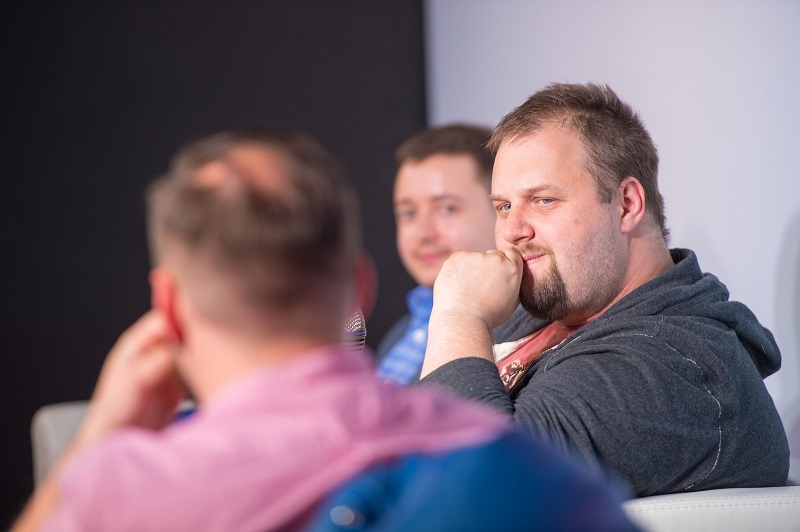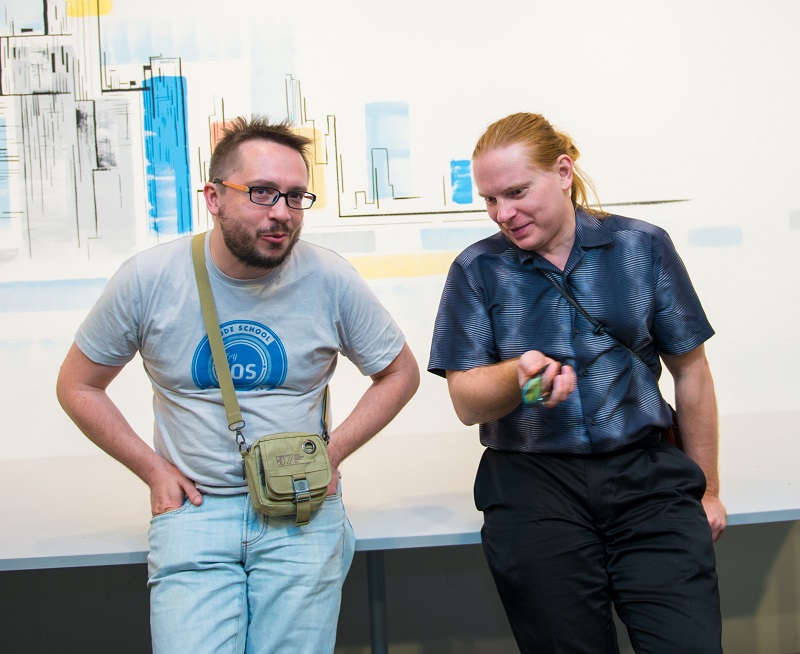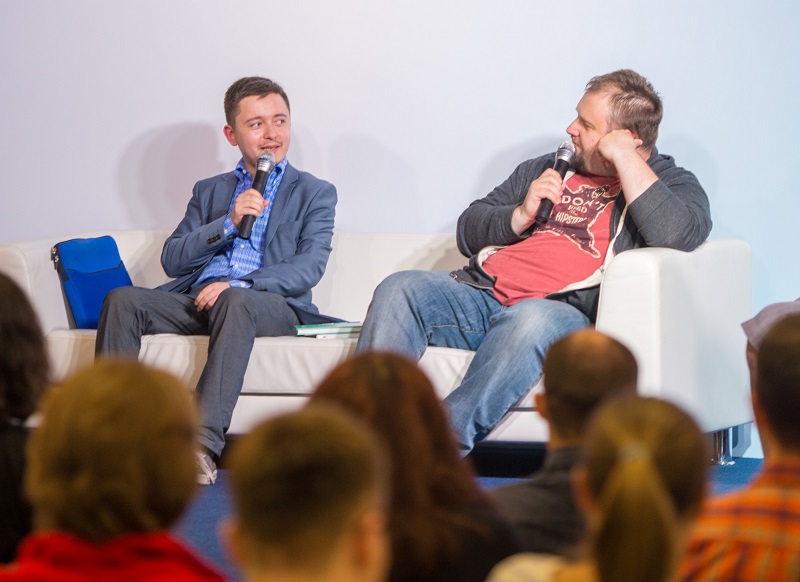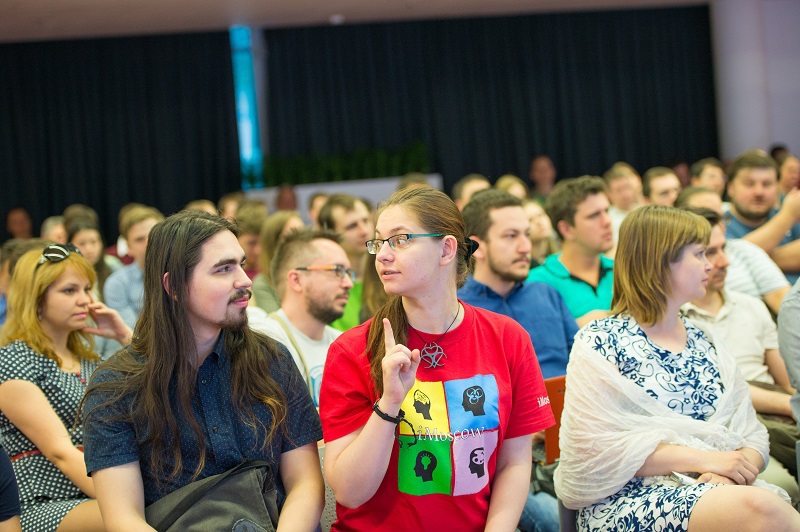An evangelist is a pain in an IT company, and why do you need it
Last Tuesday, we decided to dilute our business gatherings at the TV series "Silicon Valley" with real geeks — Grigory Bakunov and Mikhail Chernomordikov.

We just have a year now that we believe that our small company has evangelicals. But when we talk to someone about this, no one understands: what, how, why, what are they about? At some point we no longer understand. And they decided to understand the domestic "primary sources". But at the same time they found out whether it is a good career for a developer, and why they will kick you if you decide to find an evangelist in the company - or in yourself.
')
- We re-read Wikipedia three times, but did not understand, the evangelist is who in general?
Grigory Bakunov: Remember the meme “tyzhprogrammist”?
So, it does not go anywhere, and in this case.
In fact, in IT there is a large segment of specialties - well, it has historically happened - in which it is never clear what a person ultimately does.
No one, for example, knows what marketers are doing in the end: someone thinks that this is “people about the product”, someone thinks that this is “everything about advertising”, others talk about “messages and communications” ... And only in the case of the director, everyone knows what he does.
Mikhail Chernomordikov: I think that in a few decades all evangelists will do the same thing - their task will be to develop ecosystems around platforms and technologies.
And today, yes, although the topic itself is already 20 - or how many, that's even more, they tell me, years, you can meet an “evangelist” who goes and says: “We have the coolest product, look, it’s the brightest, it’s the thin, the most beautiful, buy this product! "
But, in general, it's just a very cool seller. And the goal of sales - is to sell, to fulfill the quota, and even better - to get a bonus. That is, sell more, make some kind of upsale. And the goal of an evangelist is to make a joint long-term investment of time, effort, find a person and build with him something that will grow in a few years.
Well, someone by “evangelist” generally implies such a b2b-sales, a person who is looking for other companies with whom you may have joint business interests ...
- Here is the last, this is probably the person who will drink all?
Chernomordikov: Yes, yes, a person who possesses such important positive qualities as to be successful in the labor market ...
(Bobuk laughs)


In general, in the world, probably, there are now 1,000 people in Microsoft evangelists, we really are many.
But when Windows was created, no Windows evangelist existed. And all this appeared when it became clear that not only Microsoft itself should write programs for it.
After all, there is, conditionally, a man who invents Windows himself, he has his own goal: he thinks how to make it good, beautiful, pleasant, everyone uses it, everyone is happy ... But there are also other people who, for example, they want to launch something interesting for the Bali market, while they themselves - from Irkutsk, for example.
- Well, they can come to the Novosibirsk office of Yandex and from there already ...
Chernomordikov: Well, maybe. But you can come to Microsoft, and Microsoft Russia and Microsoft in Bali together agree on helping a developer from Irkutsk, if he has a good product, and tell the user in Bali that here, look, there is such an interesting application.
In general, I think that evangelism is not about the product as such. That is, the evangelist, I repeat, does not say "we have a great product," and even more so, he will in no way say that "our product is great, and all the others are terrible." He says: "Together with our technology, product or platform, you can do something big." This is more like how I understand evangelism.
Bakunov: I would add that, pay attention, if you communicate with evangelicals in a project, almost none of them lie.
The job of an evangelist is not to sell the technology as widely as possible. This is a person who is almost always ready to admit mistakes, who is ready to say: “Well, yes, here it’s still bad for us, but let me do everything to make it much better.”
That is, in fact, such work, which is very strongly tied to honesty. That's all. This is probably the main difference from the same sales or “brand advocates”. An evangelist is a person who, first of all, is in the middle between what you would call a “brand” and an external audience. The evangelist is a conductor in both directions.
- Both of you were developers ...
Bakunov: I still still ...
Chernomordikov: And I probably will not be able to do much already, but yes, I wrote in C ++, C # ...
- Well, yes, and here for you evangelism is a good career development?
Chernomordikov: It seems to me that career is a very individual thing, and it depends very little on the profession.
It happens that a person wrote the code, and then realized that he wants to not only write it, but also tell others about it. And it happens that he loves only to write code and hates all people, does not want to communicate with anyone.
“I am writing code and I want to make a company that will cost a billion dollars, I want to become an entrepreneur,” this is also a good option.
That is, all people have their own interests, their abilities, and, it seems to me, the profession has a very weak effect on this.
Bakunov: You know, those who really achieve something and want something, always have some global plans: to change the world, to make it better, to achieve some brilliant successes, and so on.
And then everyone just chooses the method that seems to him the most correct. This is a story about a career, in fact. Well, for me and for Misha, as far as I know, this happened something like this.

I know a man who programmed most of his life - 20 years. Then at some point he realized that in order to more effectively develop what he did, he needed to go to the people and start talking about it as widely as possible.
Because for him it was the only way to get what he was doing to move on.
- Or maybe you need something else: not to be an introvert, for example?
Bakunov: I can tell from the experience of one of my companies, which I have outside of Yandex, that no communication skills, except the ability to convey my thoughts, are not needed.
In my side-company, the guy who communicates with the developers, promotes the SDK, almost never leaves the house - he just has vision problems. But this does not prevent him from communicating well with people. And he does not have a great communication skill.
In general, developers who communicate with other developers are always the same introverts as any average developer. Misha will not lie.
You know, my favorite anecdote is about how a developer interovert differs from an extrovert developer. The first, when you communicate, looks at his shoes, and the second - at the shoes of the interlocutor.
Chornomordikov: I am your shoes, Grish, by the way, at the meeting considered.
Bakunov: Thank you, and I am your sneakers.

I mean, the main thing is to sincerely love that product, the platform that you are going to excuse and promote. After all, the word "evangelist" is quite accurate: the main thing that is required of you is the belief that this is really a very cool thing that will change the world (because if it does not change the world, then why do you need it at all?) And knowing deep knowledge of what this thing does, how it works - and why it works.
And yes. If an evangelist tells me only good things, then this is no good evangelist.
Bakunov: The fact is that an evangelist is not a position, it is a role. This is such a role in the team. This is a group of people or a person who has assumed some responsibility for the product, for the technology, for the platform.
His task is not only to bring faith and knowledge about technology to the outside, but also to bring the needs and requirements of developers or consumers inside the company. His task is to help them all, understand?
And at the same time he is the man whom everyone hates: this is a very ungrateful work, very ungrateful.
He knows all the shortcomings of what is happening inside, and cannot bring them out, he knows all the problems of people outside, and tries not to carry them inside, because his task is also to carry the positive in both directions.
This is a hell of a job that probably will never be appreciated by either the leadership or the people outside. That is, you may come and praise, but no one will ever appreciate the amount of work you do. In this sense, I bow to Misha, because it is much easier for me, really.
Chernomordikov: Everyone is afraid of you simply.
Bakunov: You know, no, we just still have a family-type company, in which Arkady Yuryevich can come and say: “Well, what kind of garbage?” I will say: “Well, yes, well, that's such garbage”, - and this whole conversation will end.

You know, I have been working in Yandex for a little over 15 years. And once every three years I read articles from major experts, analysts, journalists who say that the company is losing ground.
And every time we all sincerely experience, we think: “Well, yes, indeed.” The problem is that we constantly think that we work very little, that we haven't done enough, we need to be bigger, faster, move better and come up with some new things. Well, the evangelist is always the one who already knows the real state of things.
I know many evangelists who, a year, two years after leaving their companies, began to super-actively hate them.
And it is very easy to explain: remember “one step from love to hate”? Here it is, in fact. When you terribly love that company, you terribly love the product you are working on, you know all the smallest bugs and defects, you accumulate dissatisfaction with all this wonderful substance. When you leave the company and stop forcing yourself to constantly think in a positive way, of course, negative things come up. And it is obvious that they are piling up, piling up ... And sooner or later they break through.
Therefore, quite often an evangelist, a couple of years after leaving the company, begins to be such a generator of negativity, perhaps. But it seems to me that people have long been accustomed to this, and look at it, well, like the fact that the guy scolds his ex, relatively speaking.
It saves me that the work is extremely diverse. If today I feel that I came in some depresnyak in the morning, I didn’t get enough sleep, something else, I always have something to do.
For example, inside the company there is an interesting product for me, which I do a lot of now - these are technologies related to voice. This is incredibly interesting and incredibly cool, I can talk about it for hours, so you don’t want to hear about it - some people inside the company are already trying to get round to me, because I am constantly talking about it ...
Chernomordikov: It seems to me that you rightly said that an evangelist is a person who knows very well all the problems inside, but at the same time believes in his company.
And, by the way, if a person nevertheless decided to go to another company, it is better to move to some other place, not to an evangelist, and then this can be very good. It is very easy: from an evangelist to be a developer, from an evangelist to be a marketer, there are many such examples.
Although, I note that in recent years, everything has become even more interesting. If 5 years ago it was possible to say that ecosystems completely compete with each other, now this is not there: for example, Office is on iOs and Android, and iTunes is on Windows. It seems to me impossible to change the “faith” (the evangelist is about it) to the opposite. But we have come to the state of the market, when changing one company to another does not mean changing faith.
Of course, there are times when you think that everything is not perfect with your platform, and moreover, as Grisha said, part of the work is to see and understand. And it happens that you do not really agree with the decisions that are made, it happens with all of us.
The most important thing here is how you understand the general direction and the ultimate goal: if you agree with it, then you can forgive a lot of little things that seem to you to be wrong.
I've heard about Windows-Kapets for a very long time, much longer than Grisha - about Yandex problems. That month, when I came to Microsoft, we released Windows Vista ...

Well, it seems to me that before becoming an evangelist, a person needs to stay in the place of the person with whom he will work afterwards.
I mean, evangelism is not for everyone, not only will not everyone succeed, but not everyone will like it.
Yes, an evangelist - it may just be a position, but this is probably not very good. Well, as a programmer, this can also be just a position, but this is very bad. It's great when an evangelist is a vocation that a person feels and understands that this is what he wants to do.
Frankly, if a person is an evangelist, he already knows about it. He believes that he knows: that he can help others to do joint projects. And he is from this good. Because not all people are well from this: there are many, and they are very successful in other areas.
Bakunov: Misha, and let's say honestly, that if a specific crisis breaks out in Mircosoft and half the company needs to be fired, the evangelists will go under the knife.
Chernomordikov: Well, I do not know ...
Bakunov: Ok. I just watched a few crises in various other companies, as it looked. It was very well seen when Apple handed over, how all the people who promoted it went out from there. What IBM looked like first crashes, how IBM's second crash looked like when they already had evangelists.
- Since we are talking about layoffs: what are the KPI evangelists? So how are results measured, in other words?
Chernomordikov: If we are talking about the market of mobile applications around Windows, then this can be measured by the number of people who participate in this, the growth of income from our platform, the increase in user satisfaction with these products, and so on.
If we are talking about commercial solutions based on Office, then we are talking about business productivity solutions ...
- Michael, I'm sorry, but you seem to be kidding me now. Can you just say how they decide to pay you a premium or not?
Chernomordikov: Size and quality of the ecosystem around the platform. We influence it directly.
Bakunov: And I still think that not all activities can be measured. There is, for example, the Coca-Cola company: it gives advertisements regularly before the New Year on TV, because it knows that this is necessary. But not because it can be measured.
I assure you, if they suddenly turn off this advertising, they will not notice on the background of how recognizable their brand is at all. But it is impossible to measure. Nevertheless, they intuitively feel that it is necessary.
This is the same story that happens in most companies that I know, where there is any movement associated with the promotion of a product, technology, or platform. Quite often it is not possible to measure something well, simply because of the structure of the world. But we are adults, we understand that sometimes quality is also important.

Chernomordikov: Actually, you can measure a lot. Yes, you do not always know why this is happening. But if there is a positive dynamic, you make certain conclusions that what you are doing is good.
Bakunov: Let me give you a simple example, a simple analogy. Here is a child, you feed him at the same time peas and meat. Do you understand that you cannot determine what it grows from?
Chernomordikov: It grows from proteins, fats and carbohydrates, which are contained in different things that you feed a child ...
- But who are the peas?
Bakunov: Of course you are right. Many things on Earth can be measured. But, unfortunately, the reality of life is such that, especially small companies, not all can measure.
Just because for them the prospect of measuring something for two years seems rather mysterious, especially when you just finished 10th grade, and you have only 3 months to create a company ...

Bakunov: If you want, I will say one sentence now. They don't need an evangelist.
In general, I sincerely, of course, sympathize with the person who comes to a small company to work as an evangelist. Mish, do you even imagine this strange picture? There is the CEO of the company, there is the CTO of the company, and here they both get together after lessons and decide - we need an evangelist. Why? Because we came up with a new product, and someone must believe in it.
Chernomordikov: Such an outsourcing of faith ...
Bakunov: Guys, if you have a small startup, I have to say a very simple thing to you. If you yourself are not able to be an evangelist of your product, if you yourself are not ready to talk about it at every corner, then why are you doing it at all?
Find a person who will burn them even for a salary, but, conditionally, from 10 to 18, it seems to me impossible. Yes, and not necessary.
If, of course, you have a product with the help of which you could take over the world, a product of a huge scale that requires monstrous support, working with a million people, then yes, then you probably need a special person.
And there is a very simple way to find it: no need to look for him, he will find you himself. This is the person who uses your product or platform. If you have your own product, most likely you know all your customers. And they most likely know you. At least, while you have a company of some distinct small size.
Chernomordikov: Yes, it is. An evangelist, indeed, is the very first of the early adopters. That is, this is the very first who tries everything new that you do.
Bakunov: Yes, this is by the way an important point. An evangelist is a person who comes to you and shakes: “Let me try your new product, let me test it.” The most annoying and annoying dude.
That means he cares.
PS If you scrolled in the hope of a video - it is . The glitch of sound in the first minutes is an attempt to reanimate Wirecast, change the picture and sound environment afterwards - this is after Wirecast attempt to reanimate.
PPS We decided to dedicate the following such gatherings to entrepreneurship. But there will be a part that is interesting to microelectronics - about how Aliexpress will look for factories in China for them.

We just have a year now that we believe that our small company has evangelicals. But when we talk to someone about this, no one understands: what, how, why, what are they about? At some point we no longer understand. And they decided to understand the domestic "primary sources". But at the same time they found out whether it is a good career for a developer, and why they will kick you if you decide to find an evangelist in the company - or in yourself.
')
- We re-read Wikipedia three times, but did not understand, the evangelist is who in general?
Grigory Bakunov: Remember the meme “tyzhprogrammist”?
So, it does not go anywhere, and in this case.
In fact, in IT there is a large segment of specialties - well, it has historically happened - in which it is never clear what a person ultimately does.
No one, for example, knows what marketers are doing in the end: someone thinks that this is “people about the product”, someone thinks that this is “everything about advertising”, others talk about “messages and communications” ... And only in the case of the director, everyone knows what he does.
Mikhail Chernomordikov: I think that in a few decades all evangelists will do the same thing - their task will be to develop ecosystems around platforms and technologies.
And today, yes, although the topic itself is already 20 - or how many, that's even more, they tell me, years, you can meet an “evangelist” who goes and says: “We have the coolest product, look, it’s the brightest, it’s the thin, the most beautiful, buy this product! "
But, in general, it's just a very cool seller. And the goal of sales - is to sell, to fulfill the quota, and even better - to get a bonus. That is, sell more, make some kind of upsale. And the goal of an evangelist is to make a joint long-term investment of time, effort, find a person and build with him something that will grow in a few years.
Well, someone by “evangelist” generally implies such a b2b-sales, a person who is looking for other companies with whom you may have joint business interests ...
- Here is the last, this is probably the person who will drink all?
Chernomordikov: Yes, yes, a person who possesses such important positive qualities as to be successful in the labor market ...
(Bobuk laughs)


In general, in the world, probably, there are now 1,000 people in Microsoft evangelists, we really are many.
But when Windows was created, no Windows evangelist existed. And all this appeared when it became clear that not only Microsoft itself should write programs for it.
After all, there is, conditionally, a man who invents Windows himself, he has his own goal: he thinks how to make it good, beautiful, pleasant, everyone uses it, everyone is happy ... But there are also other people who, for example, they want to launch something interesting for the Bali market, while they themselves - from Irkutsk, for example.
- Well, they can come to the Novosibirsk office of Yandex and from there already ...
Chernomordikov: Well, maybe. But you can come to Microsoft, and Microsoft Russia and Microsoft in Bali together agree on helping a developer from Irkutsk, if he has a good product, and tell the user in Bali that here, look, there is such an interesting application.
In general, I think that evangelism is not about the product as such. That is, the evangelist, I repeat, does not say "we have a great product," and even more so, he will in no way say that "our product is great, and all the others are terrible." He says: "Together with our technology, product or platform, you can do something big." This is more like how I understand evangelism.
Bakunov: I would add that, pay attention, if you communicate with evangelicals in a project, almost none of them lie.
The job of an evangelist is not to sell the technology as widely as possible. This is a person who is almost always ready to admit mistakes, who is ready to say: “Well, yes, here it’s still bad for us, but let me do everything to make it much better.”
That is, in fact, such work, which is very strongly tied to honesty. That's all. This is probably the main difference from the same sales or “brand advocates”. An evangelist is a person who, first of all, is in the middle between what you would call a “brand” and an external audience. The evangelist is a conductor in both directions.
Evangelism for developers
- Both of you were developers ...
Bakunov: I still still ...
Chernomordikov: And I probably will not be able to do much already, but yes, I wrote in C ++, C # ...
- Well, yes, and here for you evangelism is a good career development?
Chernomordikov: It seems to me that career is a very individual thing, and it depends very little on the profession.
It happens that a person wrote the code, and then realized that he wants to not only write it, but also tell others about it. And it happens that he loves only to write code and hates all people, does not want to communicate with anyone.
“I am writing code and I want to make a company that will cost a billion dollars, I want to become an entrepreneur,” this is also a good option.
That is, all people have their own interests, their abilities, and, it seems to me, the profession has a very weak effect on this.
Bakunov: You know, those who really achieve something and want something, always have some global plans: to change the world, to make it better, to achieve some brilliant successes, and so on.
And then everyone just chooses the method that seems to him the most correct. This is a story about a career, in fact. Well, for me and for Misha, as far as I know, this happened something like this.

I know a man who programmed most of his life - 20 years. Then at some point he realized that in order to more effectively develop what he did, he needed to go to the people and start talking about it as widely as possible.
Because for him it was the only way to get what he was doing to move on.
- Or maybe you need something else: not to be an introvert, for example?
Bakunov: I can tell from the experience of one of my companies, which I have outside of Yandex, that no communication skills, except the ability to convey my thoughts, are not needed.
In my side-company, the guy who communicates with the developers, promotes the SDK, almost never leaves the house - he just has vision problems. But this does not prevent him from communicating well with people. And he does not have a great communication skill.
In general, developers who communicate with other developers are always the same introverts as any average developer. Misha will not lie.
You know, my favorite anecdote is about how a developer interovert differs from an extrovert developer. The first, when you communicate, looks at his shoes, and the second - at the shoes of the interlocutor.
Chornomordikov: I am your shoes, Grish, by the way, at the meeting considered.
Bakunov: Thank you, and I am your sneakers.

I mean, the main thing is to sincerely love that product, the platform that you are going to excuse and promote. After all, the word "evangelist" is quite accurate: the main thing that is required of you is the belief that this is really a very cool thing that will change the world (because if it does not change the world, then why do you need it at all?) And knowing deep knowledge of what this thing does, how it works - and why it works.
And yes. If an evangelist tells me only good things, then this is no good evangelist.
What should I expect if I decided to take up such a position - an evangelist?
Bakunov: The fact is that an evangelist is not a position, it is a role. This is such a role in the team. This is a group of people or a person who has assumed some responsibility for the product, for the technology, for the platform.
His task is not only to bring faith and knowledge about technology to the outside, but also to bring the needs and requirements of developers or consumers inside the company. His task is to help them all, understand?
And at the same time he is the man whom everyone hates: this is a very ungrateful work, very ungrateful.
He knows all the shortcomings of what is happening inside, and cannot bring them out, he knows all the problems of people outside, and tries not to carry them inside, because his task is also to carry the positive in both directions.
This is a hell of a job that probably will never be appreciated by either the leadership or the people outside. That is, you may come and praise, but no one will ever appreciate the amount of work you do. In this sense, I bow to Misha, because it is much easier for me, really.
Chernomordikov: Everyone is afraid of you simply.
Bakunov: You know, no, we just still have a family-type company, in which Arkady Yuryevich can come and say: “Well, what kind of garbage?” I will say: “Well, yes, well, that's such garbage”, - and this whole conversation will end.

You know, I have been working in Yandex for a little over 15 years. And once every three years I read articles from major experts, analysts, journalists who say that the company is losing ground.
And every time we all sincerely experience, we think: “Well, yes, indeed.” The problem is that we constantly think that we work very little, that we haven't done enough, we need to be bigger, faster, move better and come up with some new things. Well, the evangelist is always the one who already knows the real state of things.
I know many evangelists who, a year, two years after leaving their companies, began to super-actively hate them.
And it is very easy to explain: remember “one step from love to hate”? Here it is, in fact. When you terribly love that company, you terribly love the product you are working on, you know all the smallest bugs and defects, you accumulate dissatisfaction with all this wonderful substance. When you leave the company and stop forcing yourself to constantly think in a positive way, of course, negative things come up. And it is obvious that they are piling up, piling up ... And sooner or later they break through.
Therefore, quite often an evangelist, a couple of years after leaving the company, begins to be such a generator of negativity, perhaps. But it seems to me that people have long been accustomed to this, and look at it, well, like the fact that the guy scolds his ex, relatively speaking.
It saves me that the work is extremely diverse. If today I feel that I came in some depresnyak in the morning, I didn’t get enough sleep, something else, I always have something to do.
For example, inside the company there is an interesting product for me, which I do a lot of now - these are technologies related to voice. This is incredibly interesting and incredibly cool, I can talk about it for hours, so you don’t want to hear about it - some people inside the company are already trying to get round to me, because I am constantly talking about it ...
Chernomordikov: It seems to me that you rightly said that an evangelist is a person who knows very well all the problems inside, but at the same time believes in his company.
And, by the way, if a person nevertheless decided to go to another company, it is better to move to some other place, not to an evangelist, and then this can be very good. It is very easy: from an evangelist to be a developer, from an evangelist to be a marketer, there are many such examples.
Although, I note that in recent years, everything has become even more interesting. If 5 years ago it was possible to say that ecosystems completely compete with each other, now this is not there: for example, Office is on iOs and Android, and iTunes is on Windows. It seems to me impossible to change the “faith” (the evangelist is about it) to the opposite. But we have come to the state of the market, when changing one company to another does not mean changing faith.
Of course, there are times when you think that everything is not perfect with your platform, and moreover, as Grisha said, part of the work is to see and understand. And it happens that you do not really agree with the decisions that are made, it happens with all of us.
The most important thing here is how you understand the general direction and the ultimate goal: if you agree with it, then you can forgive a lot of little things that seem to you to be wrong.
I've heard about Windows-Kapets for a very long time, much longer than Grisha - about Yandex problems. That month, when I came to Microsoft, we released Windows Vista ...

Well, it seems to me that before becoming an evangelist, a person needs to stay in the place of the person with whom he will work afterwards.
I mean, evangelism is not for everyone, not only will not everyone succeed, but not everyone will like it.
Yes, an evangelist - it may just be a position, but this is probably not very good. Well, as a programmer, this can also be just a position, but this is very bad. It's great when an evangelist is a vocation that a person feels and understands that this is what he wants to do.
Frankly, if a person is an evangelist, he already knows about it. He believes that he knows: that he can help others to do joint projects. And he is from this good. Because not all people are well from this: there are many, and they are very successful in other areas.
Bakunov: Misha, and let's say honestly, that if a specific crisis breaks out in Mircosoft and half the company needs to be fired, the evangelists will go under the knife.
Chernomordikov: Well, I do not know ...
Bakunov: Ok. I just watched a few crises in various other companies, as it looked. It was very well seen when Apple handed over, how all the people who promoted it went out from there. What IBM looked like first crashes, how IBM's second crash looked like when they already had evangelists.
- Since we are talking about layoffs: what are the KPI evangelists? So how are results measured, in other words?
Chernomordikov: If we are talking about the market of mobile applications around Windows, then this can be measured by the number of people who participate in this, the growth of income from our platform, the increase in user satisfaction with these products, and so on.
If we are talking about commercial solutions based on Office, then we are talking about business productivity solutions ...
- Michael, I'm sorry, but you seem to be kidding me now. Can you just say how they decide to pay you a premium or not?
Chernomordikov: Size and quality of the ecosystem around the platform. We influence it directly.
Bakunov: And I still think that not all activities can be measured. There is, for example, the Coca-Cola company: it gives advertisements regularly before the New Year on TV, because it knows that this is necessary. But not because it can be measured.
I assure you, if they suddenly turn off this advertising, they will not notice on the background of how recognizable their brand is at all. But it is impossible to measure. Nevertheless, they intuitively feel that it is necessary.
This is the same story that happens in most companies that I know, where there is any movement associated with the promotion of a product, technology, or platform. Quite often it is not possible to measure something well, simply because of the structure of the world. But we are adults, we understand that sometimes quality is also important.

Chernomordikov: Actually, you can measure a lot. Yes, you do not always know why this is happening. But if there is a positive dynamic, you make certain conclusions that what you are doing is good.
Bakunov: Let me give you a simple example, a simple analogy. Here is a child, you feed him at the same time peas and meat. Do you understand that you cannot determine what it grows from?
Chernomordikov: It grows from proteins, fats and carbohydrates, which are contained in different things that you feed a child ...
- But who are the peas?
Bakunov: Of course you are right. Many things on Earth can be measured. But, unfortunately, the reality of life is such that, especially small companies, not all can measure.
Just because for them the prospect of measuring something for two years seems rather mysterious, especially when you just finished 10th grade, and you have only 3 months to create a company ...
[Behind the brackets] Especially for those who make their small companies

Bakunov: If you want, I will say one sentence now. They don't need an evangelist.
In general, I sincerely, of course, sympathize with the person who comes to a small company to work as an evangelist. Mish, do you even imagine this strange picture? There is the CEO of the company, there is the CTO of the company, and here they both get together after lessons and decide - we need an evangelist. Why? Because we came up with a new product, and someone must believe in it.
Chernomordikov: Such an outsourcing of faith ...
Bakunov: Guys, if you have a small startup, I have to say a very simple thing to you. If you yourself are not able to be an evangelist of your product, if you yourself are not ready to talk about it at every corner, then why are you doing it at all?
Find a person who will burn them even for a salary, but, conditionally, from 10 to 18, it seems to me impossible. Yes, and not necessary.
If, of course, you have a product with the help of which you could take over the world, a product of a huge scale that requires monstrous support, working with a million people, then yes, then you probably need a special person.
And there is a very simple way to find it: no need to look for him, he will find you himself. This is the person who uses your product or platform. If you have your own product, most likely you know all your customers. And they most likely know you. At least, while you have a company of some distinct small size.
Chernomordikov: Yes, it is. An evangelist, indeed, is the very first of the early adopters. That is, this is the very first who tries everything new that you do.
Bakunov: Yes, this is by the way an important point. An evangelist is a person who comes to you and shakes: “Let me try your new product, let me test it.” The most annoying and annoying dude.
That means he cares.
PS If you scrolled in the hope of a video - it is . The glitch of sound in the first minutes is an attempt to reanimate Wirecast, change the picture and sound environment afterwards - this is after Wirecast attempt to reanimate.
PPS We decided to dedicate the following such gatherings to entrepreneurship. But there will be a part that is interesting to microelectronics - about how Aliexpress will look for factories in China for them.
Source: https://habr.com/ru/post/291572/
All Articles